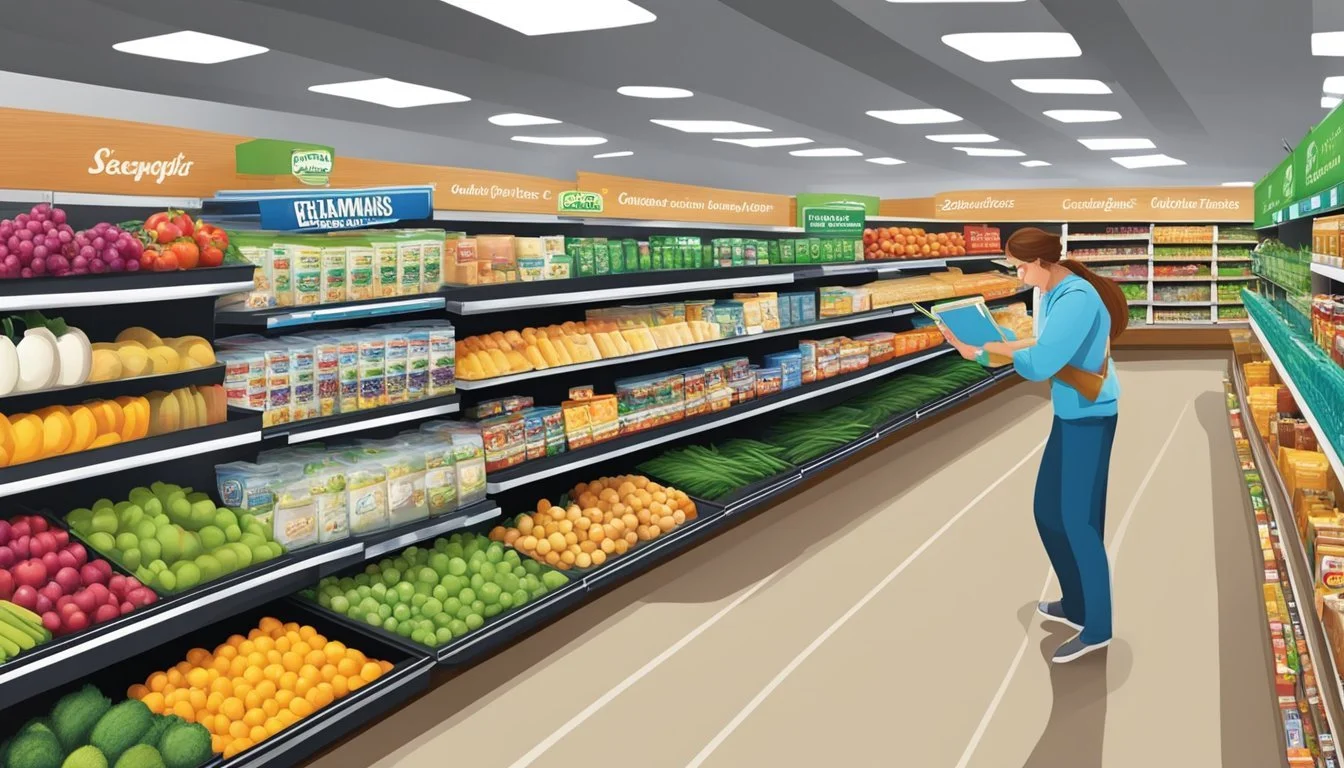Is Albertsons Cheaper Than Wegmans?
Comparing Grocery Pricing
Part of Our Grocery Store Guide with Details on Albertsons Prices and Wegmans Prices
When shoppers consider their grocery options, price is often a leading factor in their decision-making process. Comparing Albertsons and Wegmans, two prominent grocery retailers, reveals insights into their pricing strategies that impact consumer choice. Historically, Wegmans has been praised for offering lower prices than traditional chains; however, recent analyses suggest that Wegmans may represent one of the pricier options in specific regions like Boston and Philadelphia.
Albertsons, another major player in the grocery industry, competes by offering lower prices on many items when compared to competitors like Wegmans. A detailed comparison of costs for a range of products at both Albertsons and Wegmans continually shows Walmart as the most budget-friendly choice. Nevertheless, for customers not in proximity to a Walmart, the choice between Albertsons and Wegmans is more prevalent.
The grocery market is dynamic, and prices can fluctuate based on location, product availability, and promotional offers, which means that no single store consistently offers the lowest prices across all markets or product categories. Consumers must assess the pricing at their local stores to determine the most cost-effective shopping experience. Albertsons may offer lower prices on certain items, while Wegmans might present better deals in another category or present an overall better shopping experience that some customers may find worth the additional cost.
Comparing Albertsons and Wegmans
In assessing Albertsons and Wegmans, one considers the legacy and reach of each supermarket chain, the varying geographic presence, and a breakdown of pricing and costs typical of each brand.
Brand Overview and History
Albertsons Companies, Inc. began in 1939, founded by Joe Albertson in Boise, Idaho. It has grown substantially over the decades to become one of the largest food and drug retailers in the United States. Wegmans Food Markets, Inc., on the other hand, is a family-owned supermarket chain founded in 1916 in Rochester, New York. Wegmans is known for its customer loyalty, focus on employee welfare, and wide range of product offerings, including an emphasis on organic and prepared foods.
Store Presence and Location
Albertsons boasts a significant presence with over 2,200 stores across the United States, under various banners such as Safeway, Vons, and Jewel-Osco. Its stores are widespread, found in many states, with a strong concentration in the Western and Southern parts of the country. Wegmans has a smaller footprint, with around 100 stores, primarily located in the Mid-Atlantic and Northeast regions. Wegmans prides itself on creating a unique shopping experience, leading to a dedicated customer base where it operates.
Price Range and Average Costs
When comparing prices, Albertsons often positions itself as a conventional supermarket offering competitive pricing. Wegmans, while it may have certain categories where prices are lower, often is perceived to have a higher overall price point in comparison to national averages; however, this reflects its focus on quality and a variety of specialty items. For shoppers, a direct comparison between the two chains can vary depending on the region and the specific items in question.
Category Albertsons Wegmans Dairy $$ $ Frozen Foods $$ $$ Beverages $$ $$$ Baking Goods $$ $$$ Prepared Foods $$$ $$$
Note: $ = lower prices, $$ = moderate prices, $$$ = higher prices
These comparisons give insight into the typical costs consumers might expect while shopping, noting that prices at both Albertsons and Wegmans fluctuate by location and availability.
Price Analysis
This section examines the cost-effectiveness of shopping for groceries at Albertsons compared to Wegmans through a structured approach, including specific item price checks and the application of discounts and coupons.
Methodology for Price Comparison
The methodology involves selecting a diverse range of common grocery items at both Albertsons and Wegmans. Prices are recorded for identical or similar items, ensuring size and brand consistency where possible. Sale prices and promotions are noted but are assessed separately to ascertain regular pricing patterns.
Common Items Pricing
A comparative analysis of everyday essentials yields concrete data on which retailer offers better value. Grocery staples such as bread, milk, eggs, and produce are compared. For example:
Milk: Albertsons - $2.99/gallon, Wegmans - $3.19/gallon
Bread: Albertsons - $1.99/loaf, Wegmans - $2.29/loaf
Eggs: Albertsons - $2.49/dozen, Wegmans - $2.79/dozen
Discounts and Coupons
Both Albertsons and Wegmans offer store-specific discounts and manufacturer coupons. Albertsons frequently promotes weekly deals with their "Just for U" loyalty program, which can lead to significant savings. Wegmans also offers a variety of digital coupons and promotes its Shoppers Club.
It should be noted that the actual savings from discounts and coupons will vary by shopper depending on the items they purchase and their propensity to utilize such offers.
Quality and Selection
When comparing Albertsons to Wegmans, one has to consider the variety and quality of their products. Each store presents a distinct approach to product selection, organic offerings, and house brand options.
Assortment of Goods
At Wegmans, customers often find a diverse array of goods with a significant emphasis on both variety and quality. They tend to offer an extensive selection of high-quality produce, including fruits and vegetables, which appeals to consumers' desire for fresh, nutritious options. In contrast, Albertsons offers a comprehensive selection, but the focus on the range of unique or exotic items may not be as pronounced as at Wegmans.
Organic and Prepared Foods
Wegmans is generally recognized for its wide range of organic produce and prepared foods, often featuring an assortment that spans from traditional to gourmet selections. The store is also known for providing customers with a substantial variety of organic and health-centric options. Albertsons, while offering a selection of organic items, may not match the scale or diversity found at Wegmans. However, both stores respond to the growing demand for convenient, ready-to-eat meals with their respective lines of prepared foods.
Store Brand versus National Brands
When it comes to store brands, Wegmans typically positions its brand as comparable to, if not exceeding, national brand quality. Notably, their store brand is often cited as being more affordable while still maintaining high standards. For example, everyday items like white sandwich bread and raw meats from Wegmans' store brand are considered high-quality alternatives to national brands. Albertsons also competes with its store brands, offering competitive quality and pricing, although the perception of value can be different market by market.
In each subsection, it's clear that both Albertsons and Wegmans strive to cater to their customers' preferences for quality products, with Wegmans often being noted for its extensive high-quality and organic selections, while Albertsons competes strongly with its own brand offerings.
Consumer Experience
When comparing Albertsons to Wegmans, consumers often consider the ambiance of the store, the effectiveness of the checkout process, and the attentiveness of customer service. Each aspect contributes significantly to customer satisfaction and overall shopping experience.
Shopping Atmosphere
Albertsons: Typically follows a traditional supermarket layout, making it familiar and easy to navigate. The store design is functional, focusing on practicality rather than experiential shopping.
Wegmans: They offer a unique shopping atmosphere with a market-like feel and exceptional store design, aiming to provide an enjoyable shopping experience. Their stores often feature extensive prepared food sections and a variety of specialty departments.
Checkout Efficiency
Albertsons: The checkout process at Albertsons can vary, but it generally seeks to balance speed with customer interaction. Self-checkout options are available for convenience.
Wegmans: Known for their technological investments in streamlining the checkout experience, Wegmans often implements innovative systems to reduce wait times. Their stores usually have multiple checkout options, including self-checkout, to accommodate different customer preferences.
Customer Service Ratings
Consumer Ratings:
Supermarket Chain Customer Service Score Albertsons 3.5/5 Wegmans 4.5/5
Albertsons: Receives average to good customer service ratings. Patrons appreciate the staff's helpfulness but note variability across different locations.
Wegmans: Consistently high ratings for customer service underscore their commitment to a superior shopping experience. They are often commended for their friendly and knowledgeable employees who go above and beyond.
Additional Services and Benefits
When comparing Albertsons and Wegmans, one should consider the loyalty programs, grocery delivery and pickup options, and exclusive deals and partnerships that each retailer offers. These services can have a significant impact on the overall shopping experience and cost savings.
Loyalty Programs
Both Albertsons and Wegmans feature loyalty programs designed to reward customers and encourage repeat business. Albertsons' Just for U program provides personalized deals and discounts based on the customer's shopping history. Wegmans, on the other hand, offers the Shoppers Club, which extends digital coupons and notifications about upcoming sales to its loyalty following.
Grocery Delivery and Pickup
Albertsons: Offers delivery services which can be scheduled through their website or app. Prices for delivery vary based on time slots and order value.
Wegmans: Provides customers with a pickup option, and has partnered with third-party services for delivery, catering to their customers’ convenience. However, it's worth noting that Amazon Prime members may find similar or better delivery options elsewhere due to the widespread availability of Amazon's delivery network.
Exclusive Deals and Partnerships
Both supermarkets have a variety of exclusive deals that act as loss leaders, strategically priced to attract customers into their stores. Albertsons regularly features in-store promotions and savings events. Wegmans boasts a selection of store brand products often priced competitively against national brands, providing their customers with value-focused alternatives.
It's essential for consumers to explore these additional services and benefits as they can greatly affect one's overall grocery shopping expenses and experience.
Financial Savings Tips
Saving money on groceries is achievable by utilizing strategic approaches to take advantage of discounts and price variations between stores. Shoppers can optimize their savings at Albertsons, Wegmans, or any other grocery store by employing the effective use of coupons and adopting various money-saving strategies.
Effective Use of Coupons
Shoppers should diligently collect and organize coupons for products they regularly purchase. By combining manufacturer coupons with store-specific deals, they can maximize their savings. Many stores also offer digital coupons which can be loaded directly onto a loyalty card or store app. It's beneficial for shoppers to subscribe to Albertsons and Wegmans newsletters, as they may find exclusive coupons not available elsewhere.
Match coupons with sales: Wait to use coupons when items are on sale to increase savings.
Read the fine print: Understanding terms and expiry dates avoids checkout issues.
Organize coupons: Keep them sorted by product category or expiration date for efficiency.
Strategies to Save on Grocery Shopping
When it comes to saving strategies beyond coupons, consumers should look for weekly ads and clearance sections for reduced prices. Bulk buying can lead to savings in the long run, especially for non-perishable items. However, shoppers need to be mindful of their consumption patterns to avoid waste. Comparing unit prices rather than item prices helps in identifying real deals. Implementing a shopping list and sticking to it prevents impulse buys that can quickly add up.
Shop during off-peak hours: Mid-week shopping can result in marked-down prices on perishables.
Use loyalty programs: Sign up for points or rewards programs offered by Albertsons and Wegmans.
Store brand products: Opt for store brands, which are often cheaper than name brands.
Limit prepared foods: They tend to be more expensive, so buying ingredients to cook at home saves money.
Market Comparison
In evaluating grocery costs, it is essential to consider comparisons between Albertsons and Wegmans, as well as how these two stores stack up against other competitors in various regional markets.
Albertsons and Wegmans vs. Other Retailers
Albertsons often positions itself as a competitive option in the grocery market, with pricing that can vary based on location and promotions. However, compared to Wegmans, which is typically found in the Northeastern U.S., like Rochester, Boston, and Philadelphia, consumers may find differences in pricing due to Wegmans' reputation for quality and slightly premium positioning.
Wegmans is rarely the least expensive option, particularly when compared to major discount retailers like Walmart and Aldi, which are renowned for their aggressively low prices. Walmart is noted for having a significant price advantage, with prices up to 16% lower than the average across various grocery chains. Aldi, as a value market, similarly offers low prices with a no-frills shopping experience.
Regional Price Variations
Grocery prices at both Albertsons and Wegmans can alter depending on the region. In areas where they directly compete, Wegmans generally prices higher than Albertsons. Beyond these two, area consumers will notice price variations among other major retailers:
In the South and Southeast, Publix and Kroger offer competitive pricing, with Kroger often having lower prices, but Publix touting a balance of quality and value.
On the West Coast, Safeway, a brand under the same parent company as Albertsons, sometimes mirrors its pricing strategy but faces stiff competition from Trader Joe’s and Sprouts, known for their specialty and organic offerings.
Costco operates on a membership model and typically offers bulk products at lower per-unit prices, a competitive factor for families and larger households.
Nationwide chains like Target and ShopRite serve area consumers with competitive pricing, whereas Whole Foods, now under Amazon, has adjusted prices, yet it typically is on the higher end associated with its organic range.
In summary, comparing Albertsons and Wegmans to their competitors involves not just the sticker price, but also regional trends and the unique market positioning each chain adopts.
Conclusion
When comparing grocery prices between Albertsons and Wegmans, data suggests that Wegmans might have higher overall pricing. However, price considerations must be assessed in conjunction with the value provided, including product variety, quality, and customer service.
The analysis indicates:
Wegmans offers a diverse range of products with an emphasis on quality, which can lead to slightly higher prices in some categories.
Albertsons has been found to have higher prices than Walmart, suggesting that Albertsons may also be more expensive compared to Wegmans in certain regions or for specific items.
Customers seeking lower prices on groceries may find Walmart as a more economical option, persistently outperforming both Albertsons and Wegmans on pricing.
Key points to consider:
Beverages, Baking Goods, and Cleaners: Walmart consistently offers more affordable options.
Canned Goods, Dairy, and Dry Goods: Wegmans sometimes provides lower prices than competitors.
Regional pricing variations mean that Wegmans can be one of the more expensive choices in some areas.
In conclusion, shoppers looking for a balance between cost and quality might prefer Wegmans, while those prioritizing budget may lean towards Walmart. Albertsons appears to be a less competitive option in terms of pricing based on the given data. It's always recommended for consumers to conduct their own comparison shopping to align grocery choices with their personal preferences and budget constraints.








